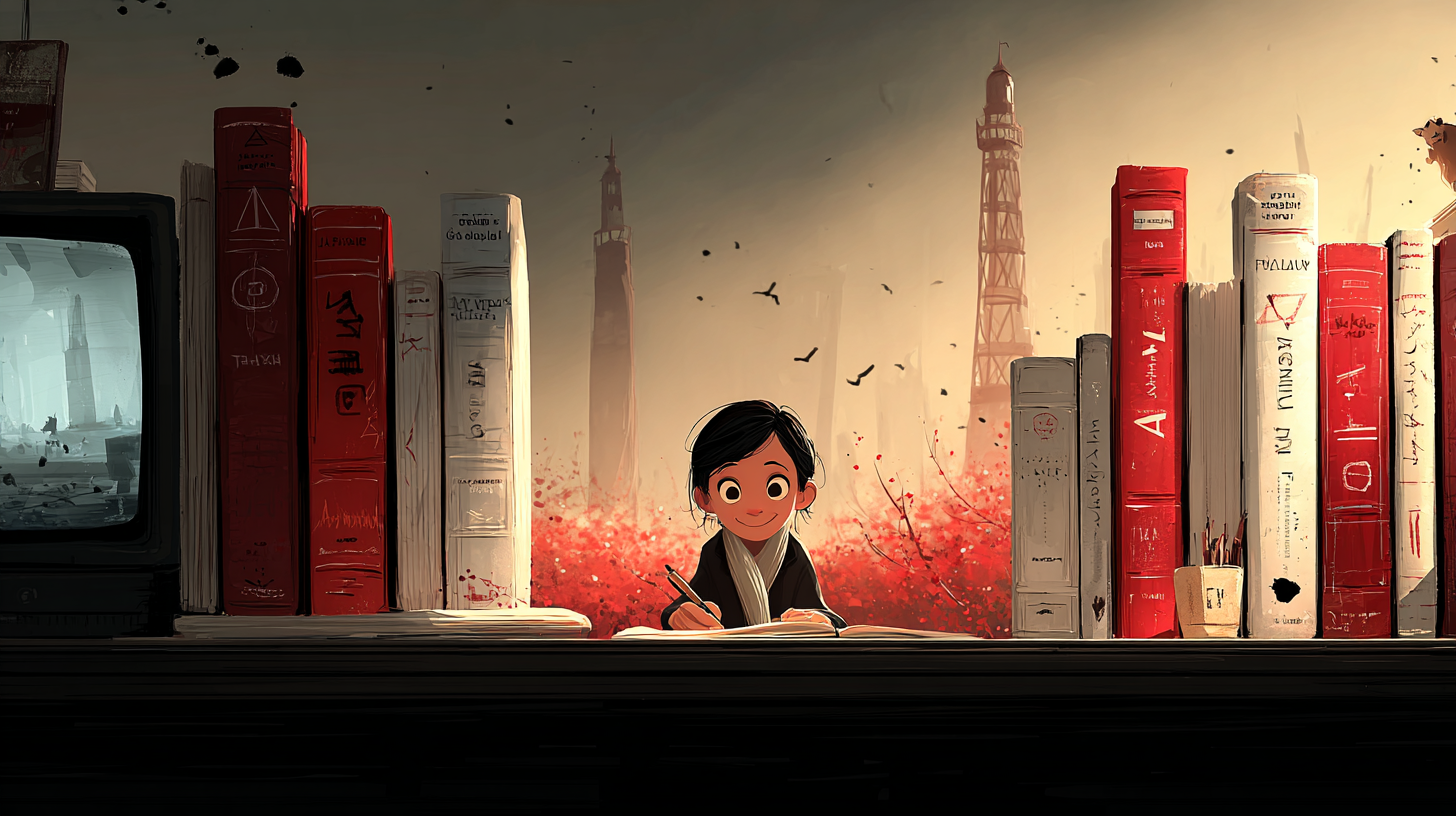A “series” means things that happen one after another, like TV shows or books that continue.
「series」は「つながって続くもの」や「テレビや本の続き物」のこと。
以下は英単語 “series” に関するストーリー型学習コンテンツです。まずは大枠の意味を理解して最後の文章で確認しましょう。
主な意味(main meaning)
| 品詞 | 発音記号 | 意味(簡潔) | 英語例文 |
|---|---|---|---|
| 名詞 (noun) | /ˈsɪəriːz/ または /ˈsɪr.iːz/ | 連続したもの、一続きのもの | The teacher showed us a series of pictures. |
| 名詞 (noun) | /ˈsɪəriːz/ | 連続した番組、シリーズ | I watched a new drama series on TV last night. |
語源(etymology)
ラテン語「serere(つなぐ、つづる)」が語源。イメージは「つながっているものの列」。
類義語(synonyms)
| 類義語 | 英語例文 |
|---|---|
| sequence | The story was told in a sequence of events. |
| chain | A chain of accidents happened on the highway. |
| set | He bought a set of books for his study. |
| collection | She has a collection of old stamps. |
反義語(antonyms)
| 反義語 | 英語例文 |
|---|---|
| individual | Each individual choice is important. |
| single | He solved the problem with a single answer. |
コロケーション(collocations)
| コロケーション | 英語例文 |
|---|---|
| a series of events | A series of events led to the company’s success. |
| TV series | My brother loves watching a comedy TV series. |
| book series | Harry Potter is a famous book series. |
| lecture series | The university offers a lecture series on history. |
2項表現(binomials)
| 2項表現 | 英語例文 |
|---|---|
| trial and error | We learned the skill by trial and error. |
| cause and effect | The teacher explained the cause and effect of pollution. |
英語ストーリー(english story)
Story:
Tom had just started his new job at a publishing company. On his first day, his manager gave him a series of tasks. The first was to review a book series for young readers. It was about a boy who solved mysteries. Tom enjoyed reading the first book, and he noticed that the sequence of events was easy to follow.
After finishing, his manager asked him to watch a TV series that was based on the same books. The company wanted to check if the TV version followed the same chain of stories as the books. Tom compared them carefully. He realized that while the collection of books showed the boy growing up step by step, the TV series sometimes skipped parts.
Later in the week, Tom was asked to prepare a lecture series for students who wanted to learn about writing. He thought carefully about the cause and effect in stories. He remembered how the book series used trial and error to show the boy solving mysteries. Tom believed students could learn a lot from this.
At the end of the week, his manager praised him. “You did not just complete a set of tasks,” she said. “You showed that you can see the big picture. You understand how a series of events connects to create meaning.” Tom felt proud, and he looked forward to the next project.
和訳
トムは出版社で新しい仕事を始めたばかりだった。初日に、上司は彼に**a series of tasks(いくつかの連続した仕事)を与えた。最初は子ども向けのbook series(本のシリーズ)をレビューすることだった。それは謎を解く少年の話だった。トムは最初の本を楽しんで読み、そのsequence of events(出来事の順序)**がわかりやすいと気づいた。
読み終えると、上司は彼に同じ本をもとにした**TV series(テレビシリーズ)を見るように頼んだ。会社はテレビ版が本と同じchain of stories(連続した物語)を守っているか確認したかったのだ。トムが比べてみると、本のcollection(全集)**では少年が一歩ずつ成長していたが、テレビシリーズでは時々省略されていた。
週の後半、トムは執筆を学びたい学生のために**lecture series(講義シリーズ)を準備するように頼まれた。彼は物語におけるcause and effect(原因と結果)について深く考えた。そして、そのbook series(本のシリーズ)が少年のtrial and error(試行錯誤)**を通して謎を解いていくことを思い出した。トムは、学生がそこから多くを学べると信じた。
週末、上司は彼を褒めた。「君はただの**set of tasks(一連の仕事)**をこなしただけではない。物事がどうつながって意味を作るか理解しているのだ」と言った。トムは誇りを感じ、次のプロジェクトを楽しみにした。
Q&A
Q: 「series」と「sequence」の違いは何ですか?
A: 「series」は「一連のもの」「続き物」として全体を指します。例えば「テレビのシリーズ」や「一連の出来事」。一方、「sequence」は「順序」や「並び方」に重点があります。例えば「映画のオープニングシーンの順序」など。
Q: 「series」と「chain」の違いは何ですか?
A: 「series」は「ただ続いているもの」を表し、中立的です。例えば「a series of lectures(一連の講義)」。
「chain」は「強くつながっている」「原因と結果で連鎖している」ニュアンスがあります。例えば「a chain of accidents(連続する事故)」では、それぞれが関係し合っているイメージです。
Q: 「series」と「set」の違いは何ですか?
A: 「series」は「順番に続いているもの」に重点があります。
「set」は「まとまり」で、必ずしも順番は不要です。例えば「a set of tools(道具一式)」は並び順は関係ありませんが、「a series of books(本のシリーズ)」は順番が重要です。
Q: 「series」と「collection」の違いは何ですか?
A: 「collection」は「集めたもの」で、テーマや共通点があれば順番がなくてもOKです。
「series」は「順番に続くこと」が前提です。例えば「a collection of short stories(短編小説集)」はバラバラに読めますが、「a series of novels(小説シリーズ)」は順番に読む必要があります。
Q: 「a series of events」と「a chain of events」の違いは?
A: 「a series of events」は「単に出来事が続いている」イメージです。
「a chain of events」は「ある出来事が次の出来事を引き起こす」ように、原因と結果でつながっている感じです。
Q: 「TV series」と「book series」の違いは?
A: 「TV series」はテレビ番組の続き物、「book series」は本の続き物を指します。どちらも「順番に続いていく作品」という点で同じですが、メディアが違います。
Q: 「series」と「lecture series」の関係は?
A: 「lecture series」は「一連の講義」で、「series」の具体的な使い方のひとつです。単に「series」に「lecture」を組み合わせただけで、意味は「講義が続いている」ということです。
Q: 「series」と「trial and error」の違いは?
A: 「series」は「続いているもの」を表す名詞です。
「trial and error(試行錯誤)」は方法や過程を表す表現で、「失敗しながら繰り返す」ことを意味します。直接の類義語ではなく、ストーリーの流れの中で対比的に使える表現です。



コメント